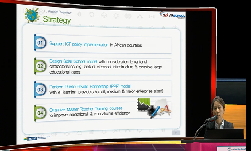This is an interpretive cultural study that examines how popular education films represent education in relation to and across cultural difference (i.e., race, class, and gender). This study also examines how audiences' lived experiences of education...
http://chineseinput.net/에서 pinyin(병음)방식으로 중국어를 변환할 수 있습니다.
변환된 중국어를 복사하여 사용하시면 됩니다.
- 中文 을 입력하시려면 zhongwen을 입력하시고 space를누르시면됩니다.
- 北京 을 입력하시려면 beijing을 입력하시고 space를 누르시면 됩니다.
https://www.riss.kr/link?id=T10597926
- 저자
-
발행사항
[S.l.]: Southern Illinois University at Carbondale 2004
-
학위수여대학
Southern Illinois University at Carbondale
-
수여연도
2004
-
작성언어
영어
- 주제어
-
학위
Ph.D.
-
페이지수
177 p.
-
지도교수/심사위원
Major Professor: Mary Hinchcliff-Pelias.
-
0
상세조회 -
0
다운로드
소속기관이 구독 중이 아닌 경우 오후 4시부터 익일 오전 9시까지 원문보기가 가능합니다.
부가정보
다국어 초록 (Multilingual Abstract)
This is an interpretive cultural study that examines how popular education films represent education in relation to and across cultural difference (i.e., race, class, and gender). This study also examines how audiences' lived experiences of education compare and contrast with film representations.
This study examined three levels of data including primary (selected education films), secondary (film publicity and criticism), and tertiary level texts (created by audience members and posted on Internet bulletin boards). I interpreted these films through the postcolonial mind-body dichotomy. The findings suggest a hierarchy of white and male bodies over non-white and female bodies that is mirrored in teaching that acknowledges the mind and logic and disavows the physical body and difference. Audiences read their own educational experiences through these films to construct a representation of education that exceeds the boundaries of the traditional classroom, accounts for the whole student, and encompasses respectful ways of being in the world. Films depicting women have attempted to recuperate the body as a source of knowledge and strength, yet these films yield to a class critique. Audiences' readings of race are also problematic for advancing a belief that Whites and Blacks equally suffer racism.
This study, while not definitive, suggests that education films speak to audiences' expectations of culture and education. Education films speak to viewers' wishes for representations of education that reflect their academic, cultural, and social selves. Films representing culturally different learning are evolving to account for and evade earlier critiques. A white, US-American perspective that is largely ignorant of White privilege seems to shape audiences' ideas about difference. This privilege along with a belief in effort-optimism seems to be fueling current commercial and filmic attempts to reclaim the body and identity in educational representations.
분석정보
연관 공개강의(KOCW)
-

Education Policy at the Party Conferences
Teachers TV Teachers TV -

2014 이러닝 국제 콘퍼런스 : What is the Lessons from Education Support Project~
한국교육정보진흥협회 Boseon, Kim -

Early Sex Education: The Debate
Teachers TV Teachers TV -

Personal Finance Education: The Money Quiz
Teachers TV Teachers TV -

Further Education: Work Experience
Teachers TV Teachers TV






